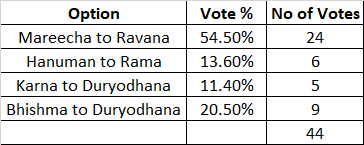Mareecha and Ravana - A lesson for us.
I am always fascinated with some specific slokas from our scriptures and epics. They are not only wise from the context of that particular epic situation but also make relevance to our regular lives. Below sloka is one such sloka.
सुलभाः पुरुषा राजन्, सततं प्रियवादिनः ।
अप्रियस्य तु पथ्यस्य, वक्ता श्रोता च दुर्लभः ॥
Transliteration:
sulabhaa.h puru.shaa raajan, satata.m priyavaadina.h |
apriyasya tu pathyasya, vaktaa "srotaa ca durlabha.h ||
Meaning:
Oh, King (Ravana)! It is easy to find people who speak pleasantly. It is hard to find a speaker or a listener who is unpleasant but honest.
सुलभाः पुरुषा राजन्, सततं प्रियवादिनः ।अप्रियस्य तु पथ्यस्य, वक्ता श्रोता च दुर्लभः ॥Who said this to whom?— The Phoenix (@AS_2103) Tweet
But why would this wise discussion happen between two vicious people like Ravana and Mareecha?
The context is as interesting as the sloka. Ravana wants to abduct Sita from Parnasala and was busy gathering intelligence to plan his action. However, Mareecha had a prior experience with Rama. To understand his experience, we have to go back to the Bala Kanda in Ramayana.
In Bala Kanda of Ramayana, Sage Vishwamitra asks Dasaratha to send Rama along with him to protect the yajna and the ashrama from the attacks of demons. Though Dasaratha was hesitant, he obliges with the orders of Sage Vishwamitra. He sends Rama and Lakshmana to protect yajnas and ashramas.
Later, in the ashrama, when Sage Vishwamitra and others were performing yajna, two demons cause hindrance to the yajna by pouring blood and puss into the yajna Vatika. Then Rama plunges into action and kills one of them. The other demon feared his death runs away from the situation. The two demons in this situation are Mareecha and his brother Subahu. Subahu was killed and Mareecha absconds from the situation.
Coming to the context of the discussion between Ravana and Mareecha, Mareecha was the uncle of Ravana (mother's brother). Ravana thinks of abducting Sita. He tells his plan to Mareecha and asks him to gather intelligence for further planning. At this point, Mareecha warns Ravana not to indulge in any misadventure and lists out the virtues of Rama. Then, Ravana berates Mareecha for lecturing him about the virtues of Rama and warns him that he would kill Mareecha by himself if he tries to praise Rama in front of him. At this moment, for one last time, Mareecha says the above sloka and tries to counsel Ravana about the possible ruination he would face if he abduct Sita and confront Rama. Despite all his efforts, he was not able to convince Ravana. When Ravana threatens to kill Mareecha, he agrees to play along, as the golden deer, so that he can be killed by Rama instead of being killed by Ravana.
We all know the rest of the story of Ramayana.
If we observe, the beauty of sloka lies not in the context of Ramayana alone. It rather lies in being attributable to our daily lives. As we see in our daily lives, we can see a lot of people speaking pleasantly to us though they are not helpful in achieving anything. On the other hand, we often tend to neglect the feedback that seems to be negative at the face value, but can help us grow.
This calls for action to annihilate Ravana's characteristics in us and accept the negative feedback, analyze it and act on it to improve ourselves.



Comments
Post a Comment